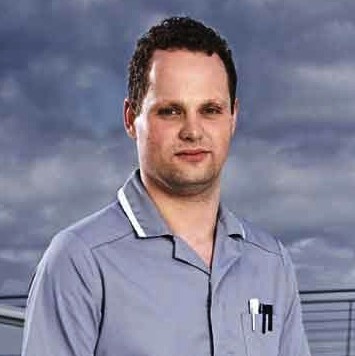Getting to know Simon…
Nurse Simon makes his first appearance in series 8, episode 2 of ’24 Hours in A&E’ (aired on 14 January 2015, 9pm on Channel 4). We hear about how working in the stressful environment of A&E means Simon and his colleagues need to find ways to let off steam.
What is your role within A&E?
I’m one of the Emergency Care nurses in A&E. We’re a group of nurses with extra training in critical care and we co-ordinate resuscitation and also act as a learning resource for junior nurses.
How long have you worked at St George’s? Why did you want to join the team?
I’ve worked at St George’s for just over two years. My background is in intensive care nursing and I wanted to see a different side of critical care so came to St George’s A&E department. It’s my first job in A&E and it’s the best job I’ve ever had, easily.
How many patients do you treat in an average day? What conditions / illnesses do they have?
The whole Emergency Department can see up to 400 per day – but in Resus, we have eight beds so it really depends what is going on at the time. Some shifts we see 10 patients and others we see many more, it just depends. Nights are usually quieter, but we very rarely see less than eight patients in resus throughout a shift.
Conditions can range from airway breathing and circulation problems to dislocations and fractures or more complex medical conditions including seizures. We see anyone who requires quick and intensive therapy to get them better.
What did you think when they announced ‘24hrs in A&E’ was going to be filmed at St George’s?
From the get go I thought it was a great opportunity to highlight what the department does and how good it is. I particularly really wanted to push how hard nurses work. The team of nurses I work with at the moment are all very conscientious and hardworking so I was really grateful to have the chance to showcase that on national TV.
Did you find it had any impact on your day?
No, not really as it didn’t hamper the flow of the unit. The cameras are very discreet and after an hour of wearing the microphone, you forget it’s even there. As a nurse, the main priority is the patient and everything else comes secondary to that.
What have you enjoyed the most from your experience of ‘24hrs in A&E’?
The chance to meet and work with people from a non-medical background. Working in an A&E environment, your life is the hospital and so you’re always surrounded by doctors, nurses and physiotherapists, so it’s been great to interact with the producers who have a completely different job. Plus it’s been great to see the whole process of making a TV show – that was really interesting.
What has been your highlight moment of St George’s episodes so far?
My favourite part has been seeing how well Sobi, one of the Emergency Department registrars, has come across. She’s one of my best friends at work and I’m so pleased that the rest of the world can see how hard she works. Everyone says you have a work family, but we actually are like a family so it’s lovely to see everyone coming across so well and we’re all so proud of each other in the department.
What was the biggest challenge you experienced during the filming?
Dealing with end of life care and doing so on camera could be particularly challenging. I found that’s the time that I had to concentrate the most as I wanted to be supportive of the family, I wanted to deliver dignified care to the patient, and I also needed to keep the department going, so that’s a lot to think about without the cameras being there – so I suppose that was a challenge having to deal with such sensitive topics in a filmed environment. But that’s the only time the cameras ever played on my mind.
What is the benefit of St George’s participating in a show like ‘24hrs in A&E’?
It’s highlighted how good we are at our jobs and I really think this series has helped make a name for St George’s.
We’ve demonstrated that we are as good as, or better than, other trauma hospitals. We cover the largest geographical area and the demographic of trauma that we see is different to other London hospitals because of our location and that’s something we are proud to have demonstrated on TV in a positive way.
The series has proven that we provide excellent critical care, but we also provide dignified and empathetic care too.
Is there anything that was or wasn’t caught on camera which you wish wasn’t or was?
I think I probably could’ve done with my dance moves not being aired!


